| Reviews & Columns |
|
Reviews DVD TV on DVD Blu-ray 4K UHD International DVDs In Theaters Reviews by Studio Video Games Features Collector Series DVDs Easter Egg Database Interviews DVD Talk Radio Feature Articles Columns Anime Talk DVD Savant Horror DVDs The M.O.D. Squad Art House HD Talk Silent DVD
|
DVD Talk Forum |
|
|
| Resources |
|
DVD Price Search Customer Service #'s RCE Info Links |
|
Columns
|
|
|
Metamorphosis: Beyond The Screen Door
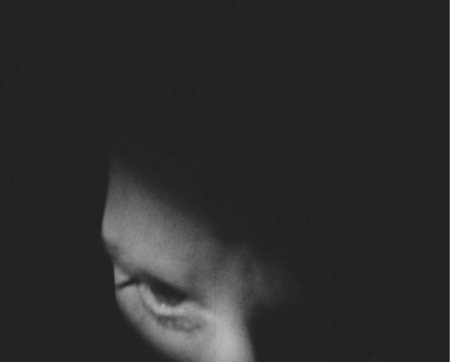
The Metamorphosis, a short novel first published nearly a century ago, remains one of German author Franz Kafka's most memorable works. This slow-burning tale is defined by the strange fate of our central character, Gregor Samsa, a salesman who awakens one morning to discover that his body has changed completely. Gregor has become an insect-like creature for reasons unknown, and his family and friends react accordingly. Sadly, Gregor's life doesn't get any easier: he eventually succumbs to the shame and isolation caused by his terrible new identity, never returning to his former self. The Metamorphosis has been studied, written about and mulled over since 1915, and for good reason: it's a simple story well told, and one that can be interpreted on many different levels. Kafka's novella is hardly the first surreal story in existence, but it's paved the way for countless like-minded works during the last century.
First things first: this release's cover art trumpets Norith Soth's Behind the Screen Door as the first filmed adaptation of Kafka's tale...which isn't true by a long shot, even if the film's 1994 release date was off by a few years. A handful of TV and film adaptations were found with minimal research (both domestic and international), including the 1987 production starring a young Tim Roth. What does set this version apart from most adaptations, though, is the relatively loose translation here: it's essentially a "modern retelling" that tweaks certain roles, personalities and events to suit the story. Fair enough...and like Kafka's original, this story is unabashedly odd and intriguing. For this alone, Beyond the Screen Door should sit fairly well with fans of Kafka and other like-minded creators, including David Lynch, Terry Gilliam and David Cronenberg.
If nothing else, Behind the Screen Door manages to alter the atmosphere a bit, though most of the foundation remains similar: Tom Gregor is our central character and he's still the victim of a grotesque transformation. Self-absorbed family members still ridicule Tom while depending on him to pay the bills, his boss berates him for missing work and a young woman rejects him after an awkward social encounter. Apparently, he's also had a past relationship with his young sister, who turns to prostitution as the family's money quickly dries up. Accordingly, it seems to be his constant emasculation that drives Tom towards solitude and triggers the drastic transformation. Our story jumps between Tom's former life and his new identity, creating a more abstract and contemporary take on Kafka's original.
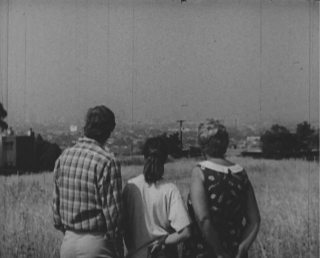
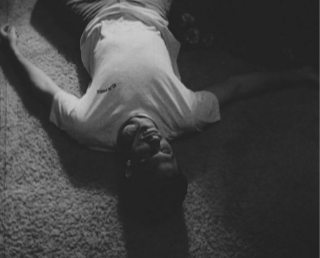
Behind the Screen Door has a number of successful elements...and a few not-so-successful ones. First, the good news: we really get inside Tom's head for the duration of this film, though compassionate viewers may grow weary of his non-stop suffering. A few not-so-subtle nods to Kafka's original pop up at times, including a rather interesting take on the "apple infection" that eventually dooms our hero---and by this point, it's almost a mercy kill. Still, other elements don't seem to add much: for starters, the overly awkward editing---and vocal dubbing, on some occasions---may lead first-time viewers scratching their heads (yes, it's all part of the show), while peppered voice-over narration leads us around by the nose before abandoning us to the film's unnatural structure. These are almost necessary evils, but they're distracting enough to feel more pretentious than practical.
As an aside, I'd also like to point out one curious little "Easter Egg": stick around during the lengthy end credits and you'll hear a miniature commentary by Brent McCarey, whose association with the film is unknown. I can't say that I agree with all of Mr. McCarey's comments regarding the film's subtext and symbolism, but it spices up an otherwise bland credit sequence.
On a technical note, Beyond the Screen Door revealed itself to be quite a mysterious production, as far as background details go. Very little can be found regarding any behind-the-scenes information; in fact, this film doesn't even appear on the director's own IMDB page. One listing on Variety.com even cites the film's running time as 80-odd minutes, whereas this DVD clocks in at just under an hour. Had Beyond the Screen Door been a more straightforward affair, it might've been easier to spot any potential trimming. For now, one can only assume that Pathfinder Entertainment's one-disc release, packaged together with the like-minded short film Telephone (covered below), represents the complete story. Let's dig a little deeper, shall we?
Much like the film's mysterious production, the original aspect ratio of Metamorphosis remains unknown, though this 1.33:1 transfer doesn't contain any obvious signs of cropping. It does, however, make this black-and-white film appear heavily worn from start to finish: black levels are inconsistent, the image is filled with dirt and scratches, and the overall softness leaves fine details out of the picture. I've got to assume that this represents an intentional decision, but why would a so-called "modern retelling" aim for such a worn-out appearance? Regardless of this issue, digital combing and edge enhancement are also a problem at times, leaving Metamorphosis with little to stand on in the visual department. It's a shame, too, because there are plenty of striking compositions on display here.
The audio doesn't fare any better: presented in what appears to be a straightforward 1.0 mono mix, there's not a lot of action or dynamic range here. Dialogue is thin but largely understandable, though the music often fights for attention; once again, it's unknown whether these are source material issues or not. Unfortunately, no optional subtitles or Closed Captions have been included during the main feature or the bonus features.
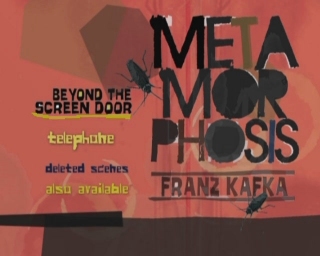
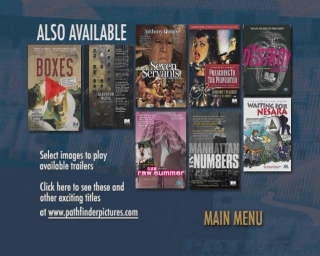
All bonus features are presented in 1.33:1 and letterboxed widescreen format, but no optional subtitles or Closed Captions are on board. It's nice to see at least one film-specific extra, but a director's interview or full-length commentary would've certainly been welcome.
The jury's still out on Beyond the Screen Door: this is certainly an interesting take on Kafka's original, yet certain elements of the production can't help but get in the way. From a basic standpoint, fans of the source material's atmosphere and attitude should enjoy Soth's interpretation, but Pathfinder's DVD presentation leaves much to be desired: not only is the technical presentation highly questionable, there's only one film-specific bonus feature. Overall, less than 90 minutes of content for $25 is a tough sell by any stretch, but interested parties may find Beyond the Screen Door worthy of a weekend viewing. Rent It.
Randy Miller III is an affable office monkey based in Harrisburg, PA. He also does freelance graphic design projects and works in a local gallery. When he's not doing that, he enjoys slacking off, second-guessing himself and writing things in third person.
|
| Popular Reviews |
| Sponsored Links |
|
|
| Sponsored Links |
|
|
| Release List | Reviews | Shop | Newsletter | Forum | DVD Giveaways | Blu-Ray | Advertise |
|
Copyright 2024 DVDTalk.com All Rights Reserved. Legal Info, Privacy Policy, Terms of Use,
Manage Preferences,
Your Privacy Choices | |||||||














